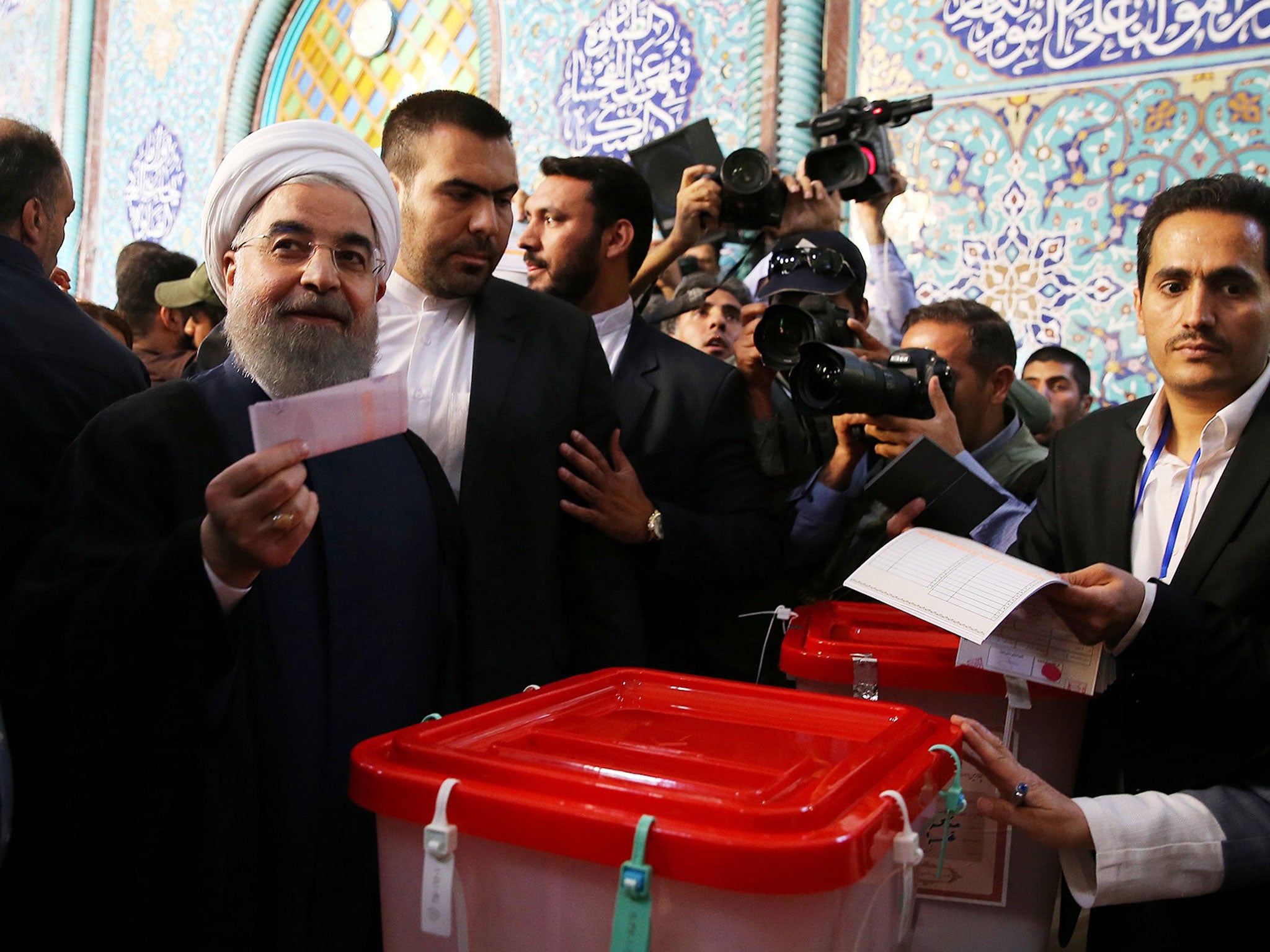Rouhani’s victory is good news for Iran, but bad news for Trump and his Sunni allies
The Saudis will be appalled that a (comparatively) reasonable Iranian has won a (comparatively) free election that almost none of the 50 dictators gathering to meet Trump in Riyadh would ever dare to hold


Your support helps us to tell the story
From reproductive rights to climate change to Big Tech, The Independent is on the ground when the story is developing. Whether it's investigating the financials of Elon Musk's pro-Trump PAC or producing our latest documentary, 'The A Word', which shines a light on the American women fighting for reproductive rights, we know how important it is to parse out the facts from the messaging.
At such a critical moment in US history, we need reporters on the ground. Your donation allows us to keep sending journalists to speak to both sides of the story.
The Independent is trusted by Americans across the entire political spectrum. And unlike many other quality news outlets, we choose not to lock Americans out of our reporting and analysis with paywalls. We believe quality journalism should be available to everyone, paid for by those who can afford it.
Your support makes all the difference.So it’s a good win for the Iranian regime – and its enormous population of young people – and a bad win for Trump’s regime, which would far rather have had an ex-judicial killer as Iranian president so that Americans would find it easy to hate him. Maybe Hassan Rouhani’s final-week assault on his grim rival candidate and his supporters – “those whose main decisions have only been executions and imprisonment over the past 38 years” – paid off. Who among Iran’s under 25s, more than 40 per cent of the population, would have wanted to vote for Ebrahim Raisi whose hands had touched the execution certificates of up to 8,000 political prisoners in 1988?
So the man who signed Iran’s nuclear agreement with the United States, who struggled (often vainly, it has to be said) to reap the economic rewards of this nuclear bomb “truce” with the West, who believed in a civil society not unlike that of former president Mohamed Khatami – who supported him in the election – won with 57 per cent of the vote, backed by 23½ million of the 41 million who cast their ballot. The corrupt and censorious old men of the Revolutionary Guard Corps and the bazaaris and the rural poor – the cannon fodder of the Iran-Iraq war as they often are in elections – have been told they no longer belong to the future.
But what a contrast this election has been to the vast congress of dictators and cut-throat autocrats greeting Donald Trump in Riyadh – just as the Iranian election results were announced. Save for Lebanon and Tunisia and Pakistan, almost every Muslim leader gathered in Saudi Arabia treats democracy as a joke or a farce – hence the 96 per cent victories of their leaders – or an irrelevancy. They are there to encourage Sunni Saudi Arabia’s thirst for war against Shia Iran and its allies. Which is why the Saudis will be appalled that a (comparatively) reasonable Iranian has won a (comparatively) free election that almost none of the 50 dictators gathering to meet Trump in Riyadh would ever dare to hold.
There are those who will remember, of course, that executions proceeded apace under Rouhani’s previous presidency – though not on the Golgotha scale of the 1988 executions – and that Rouhani’s revolutionary credentials are clear: just before Saddam Hussein’s Iraqi invasion of 1980, he managed to re-organise Iran’s tattered post-revolutionary army. But if Raisi symbolised the repressive past, Rouhani, however imperfectly, represents the future. For now.
Because everything depends on how he will respond to the madness of the Trump regime and its willingness to support the Sunni war machine with more than $100bn of weapons against Iran and its allies and friends. Rouhani must pray that Iran’s response can be political – he does at least have the satisfaction of knowing the voter turnout in Iran this week was 70 per cent against America’s miserable 58 per cent in the Trump-Clinton election last year. Iranians are a very political people and take their presidential polls seriously, even if only six out of 1,600 potential candidates were allowed to stand.
As they will the next man to be chosen as Supreme Leader when Khamenei departs. This critical position – without any precedent in Islam, it is now regarded as untouchable – could go to Ayatollah Sayed Mahmoud Hashemi Shahroudi, a man who, as head of the judiciary, reduced some of Iran’s more vicious punishments without being a true reformer. But this was true of old Hashemi Rafsanjani, the ex-president and Richelieu of Iran who died earlier this year. No one in Iranian politics can talk of reform and civil society without acknowledging the revolution and the martyrs of the 1980-88 Iran-Iraq war.
It was in the aftermath of this First World War-style conflict that the mass executions began. The only prominent cleric to stand against them was Ayatollah Ali Montazeri, whose courageous and moral decision cost him the Supreme Leadership. He spent the rest of his life under virtual house arrest. Khamenei took his place. And among the brutal men who then showed their “Islamisism” in the execution chamber, a massacre of prisoners that came to be known as the “national disaster”, Raisi could not expunge his name. Perhaps his only compensation today is that many of the Sunni Arab leaders gathered in Riyadh to applaud America’s mad President have almost as much blood on their hands. But they got “elected”.